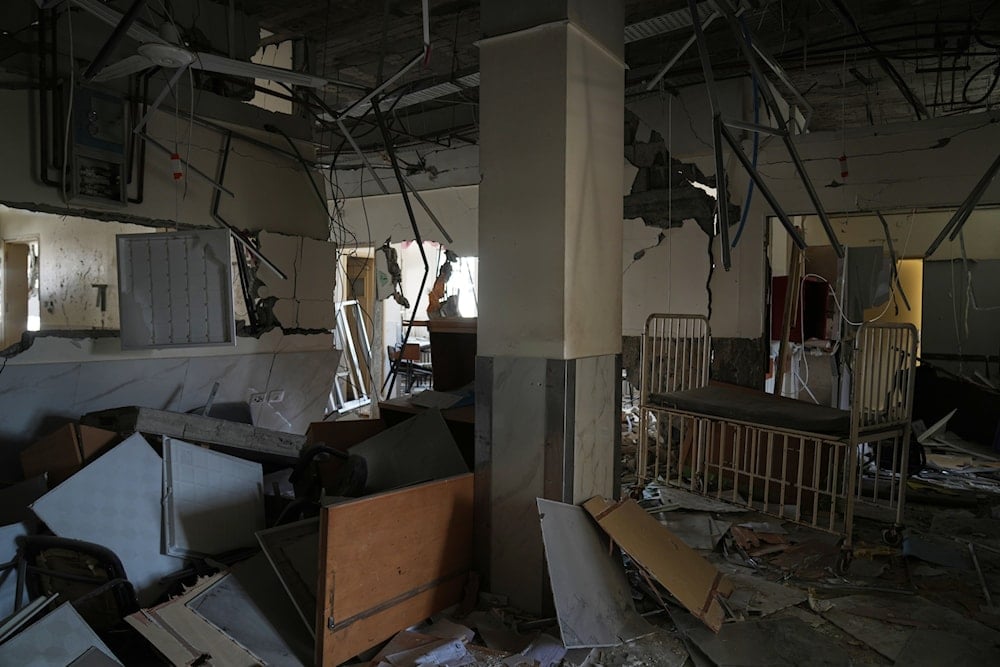WHO warns of deepening Gaza health crisis, urges opening all crossings
WHO urges full opening of crossings into Gaza to evacuate 15,000 patients and deliver vital medical supplies as the health system nears collapse under blockade.
-

A section of the children's hospital Al-Rantisi is seen heavily damaged, following the Israeli air and ground attacks, on Gaza City, on October 24, 2025 (AP Photo/Abdel Kareem Hana)
The World Health Organization’s representative in the occupied Palestinian territories, Peter Beberkor, stressed the urgent need to open all crossings into the Gaza Strip to allow for the delivery of critical medical supplies, the expansion of relief operations, and the evacuation of approximately 15,000 patients, including 4,000 children.
Speaking to UN journalists in Geneva from occupied al-Quds, Beberkor emphasized that the opening of all crossings was part of the plan agreed upon in Sharm el-Sheikh, and must be implemented without further delay.
He warned that if the evacuation process is not rapidly expanded, recovery for the sick and seriously injured could take up to a decade, with thousands of lives at risk.
Beberkor said that the health of many was deteriorating, and many children, women, and men were bound to die. He added, "That is why we are pressing hard to expand the scope of the evacuation and ensure the opening of all medical corridors, including the corridor to the West Bank and Al-Quds."
Despite a ceasefire taking effect earlier this month, Gaza’s health system remains crippled, operating at only partial capacity. According to Beberkor, only 14 out of 36 hospitals, 64 out of 181 primary care centers, and 109 out of 350 medical points are functioning, and even those are operating under severe limitations. Currently, Gaza has just 2,100 active hospital beds to serve a population of 2.1 million people.
The World Health Organization has also revealed that 88 Palestinians have been killed and 325 injured in Gaza since the ceasefire began, bringing the total since October 2023 to 68,234 martyred and 170,373 injured.
Thousands more are believed to be buried under rubble.
Ceasefire fails to stop casualties
Despite the ceasefire, humanitarian and health conditions continue to deteriorate. Medical aid crossings into Gaza remain tightly restricted, and the lack of open corridors is hampering evacuation efforts for vulnerable patients, including children requiring urgent care.
Beberkor described the situation as catastrophic, reiterating the need for full international support and coordination to prevent the collapse of what remains of Gaza’s medical infrastructure.
He estimated the initial damage to Gaza’s healthcare infrastructure at around $7 billion, noting that full recovery will require not only massive funding but also doubling the number of medical personnel and close coordination with local authorities and international partners.
Beberkor also emphasized that restoring Gaza’s healthcare system will take years, even under the best conditions, and that failure to act now will lead to more avoidable deaths and long-term suffering.
On a related note, the director-general of the WHO, Dr. Tedros Adhanom Ghebreyesus, has declared that Gaza is experiencing a health catastrophe that will last for "generations to come."
He explained on BBC Radio 4's Today programme on Thursday that a massive increase in aid is the necessary first step to begin addressing the complex needs of the people in the Strip. The WHO chief emphasized that the current level of aid allowed into the strip by "Israel" is far below the levels needed to rebuild the healthcare system in the territory.

 3 Min Read
3 Min Read











